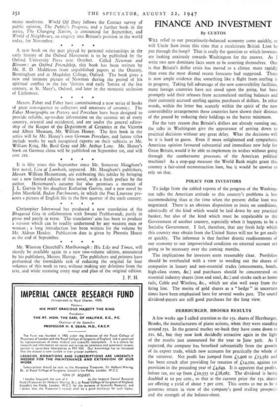FINANCE AND INVESTMENT
By CUSTOS
Wm, relief to our precariously-balanced economy come quickly, or will Uncle Sam insist this time that a recalcitrant British Lion be put through the hoop? That is really the question to which investors are looking anxiously towards Washington for the answer. As I write two new dominant facts seem to be asserting themselves. One is that Britain's dollar crisis has moved to a climax more rapidly than even the most dismal recent forecasts had suggested. There is now ample evidence that something like a flight from sterling is in progress. Taking full advantage of the new convertibility facilities, many foreign countries have not stood upon the going, but have promptly sold their releases from accumulated sterling balances and their currently accrued sterling against purchases of dollars. In other words, within the letter but scarcely within the spirit of the new convertibility arrangements these countries have shown their distrust of the pound by reducing their holdings to the barest minimum.
For the very reason that Britain's dollars are already running out, the talks in Washington give the appearance of getting down to practical decisions without any great delay. What the decisions will be it is hard to guess. Even if more enlightened and sympathetic American opinion favoured substantial and immediate new help for Great Britain, would it be able to implement its wishes without going through the cumbersome processes of the American political machine? As a stop-gap measure the World Bank might grant this country a fair-sized reconstruction loan, but it would be unwise to rely on that.
POLICY FOR INVESTORS To judge from the cabled reports of the progress of the Washing- ton talks the American attitude to this country's problems is less accommodating than at the time when the present dollar loan was negotiated. There is an obvious disposition to insist on conditions, admittedly of the kind which would be laid down by any practical banker, but also of the kind which must be unpalatable to the Government of another country, especially when it happens to be a Socialist Government. I feel, therefore, that any fresh help which this country may obtain from the United States will not be got easily or quickly. The inference is that further drastic readjustments of our economy to our impoverished condition on external account are going to be necessary over the coming months.
The implications for investors seem reasonably clear. Portfolios should be overhauled with a view to weeding out the shares of companies in luxury and non-essential trades (amusements, hotels, high-class stores, &c.) and purchases should be concentrated on essential industry shares (iron and steel, &c.) and stocks such as home rails, Cable and Wireless, &c., which are also well away from the firing line. The merits of gold shares as a " hedge " in uncertain times have been emphasised here for several weeks past. The sound dividend-payers are still good purchases for the long view.
HERRBURGER, BROOKS RESULTS
A few weeks ago I called attention to the 15s. shares of Herrburger, Brooks, the manufacturers of piano actions, when they were standing around 25s. In the general market set-back they have come down to 21S. 6d., but they now look decidedly attractive again in the light of the results just announced for the year to June 30th. As I expected, the company has benefited substantially from the growth of its export trade, which now accounts for practically the whole of the turnover. Net profit has jumped from £5,906 to £13,582 and has been struck after providing for taxation of L14,500, against tax provision in the preceding year of £4,649. It is apparent that profits, before tax, are up from £1o,555 to £28,082. The dividend is being doubled at to per cent., so that at the current price the 15s. shares are offering a yield of about 7 per cent. This seems to me to be a generous return in view of the company's good trading prospects and the strength of the balance-sheet.


































 Previous page
Previous page